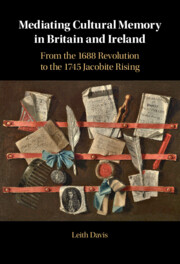 Mediating Cultural Memory in Britain and Ireland
Mediating Cultural Memory in Britain and Ireland “Transitory News-papers,” “Fleeting Pamphlets” and Knots of Cultural Memory
Published online by Cambridge University Press: 10 March 2022
Chapter 5 examines in the 1745 Jacobite Rising in the context of the expansion of the periodical press and the print marketplace in the mid-eighteenth century. Information about the events of the 1745 Rising was made available to readers in a more continuous and a more pervasive way than during the 1715 Rising. The chapter explores how this expanding circulation of information prompted greater concern not just about the trustworthiness of the genres of the newspaper and the political pamphlet but also about how citizens were consuming information. It next focuses on three genres of printed works produced after the Battle of Culloden (1746) that reworked newspaper reports into their narratives: accounts of the trials and executions of the rebels, “Chevalier” or “Pretender” narratives about the escape of Charles Edward Stuart, and popular histories. With their conscious and unconscious intertextual borrowings, these printed works, like those of the 1715 Rising, inscribe the cultural memory of the 1745 as a series of complicated knots of memory.
To save this book to your Kindle, first ensure [email protected] is added to your Approved Personal Document E-mail List under your Personal Document Settings on the Manage Your Content and Devices page of your Amazon account. Then enter the ‘name’ part of your Kindle email address below. Find out more about saving to your Kindle.
Note you can select to save to either the @free.kindle.com or @kindle.com variations. ‘@free.kindle.com’ emails are free but can only be saved to your device when it is connected to wi-fi. ‘@kindle.com’ emails can be delivered even when you are not connected to wi-fi, but note that service fees apply.
Find out more about the Kindle Personal Document Service.
To save content items to your account, please confirm that you agree to abide by our usage policies. If this is the first time you use this feature, you will be asked to authorise Cambridge Core to connect with your account. Find out more about saving content to Dropbox.
To save content items to your account, please confirm that you agree to abide by our usage policies. If this is the first time you use this feature, you will be asked to authorise Cambridge Core to connect with your account. Find out more about saving content to Google Drive.